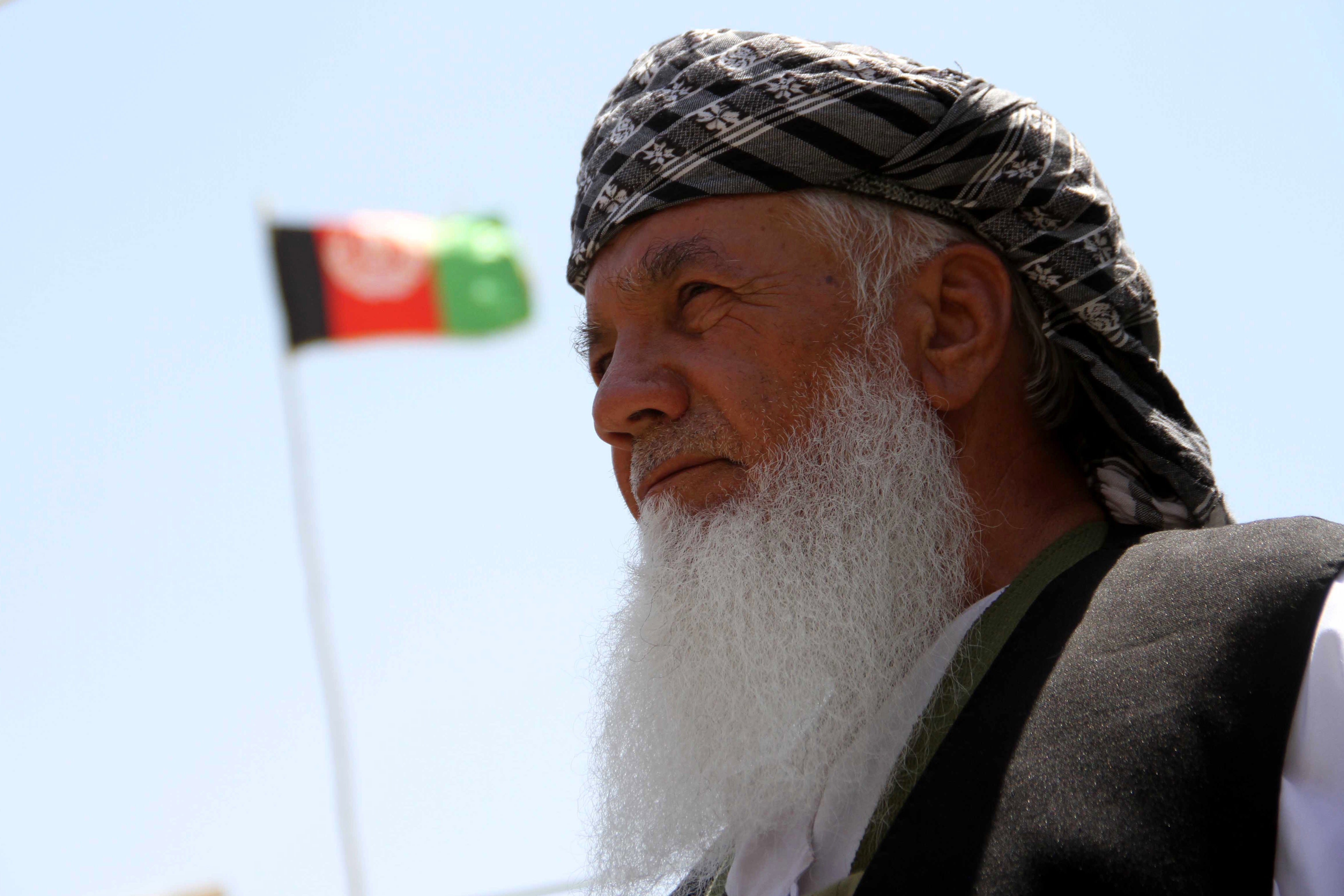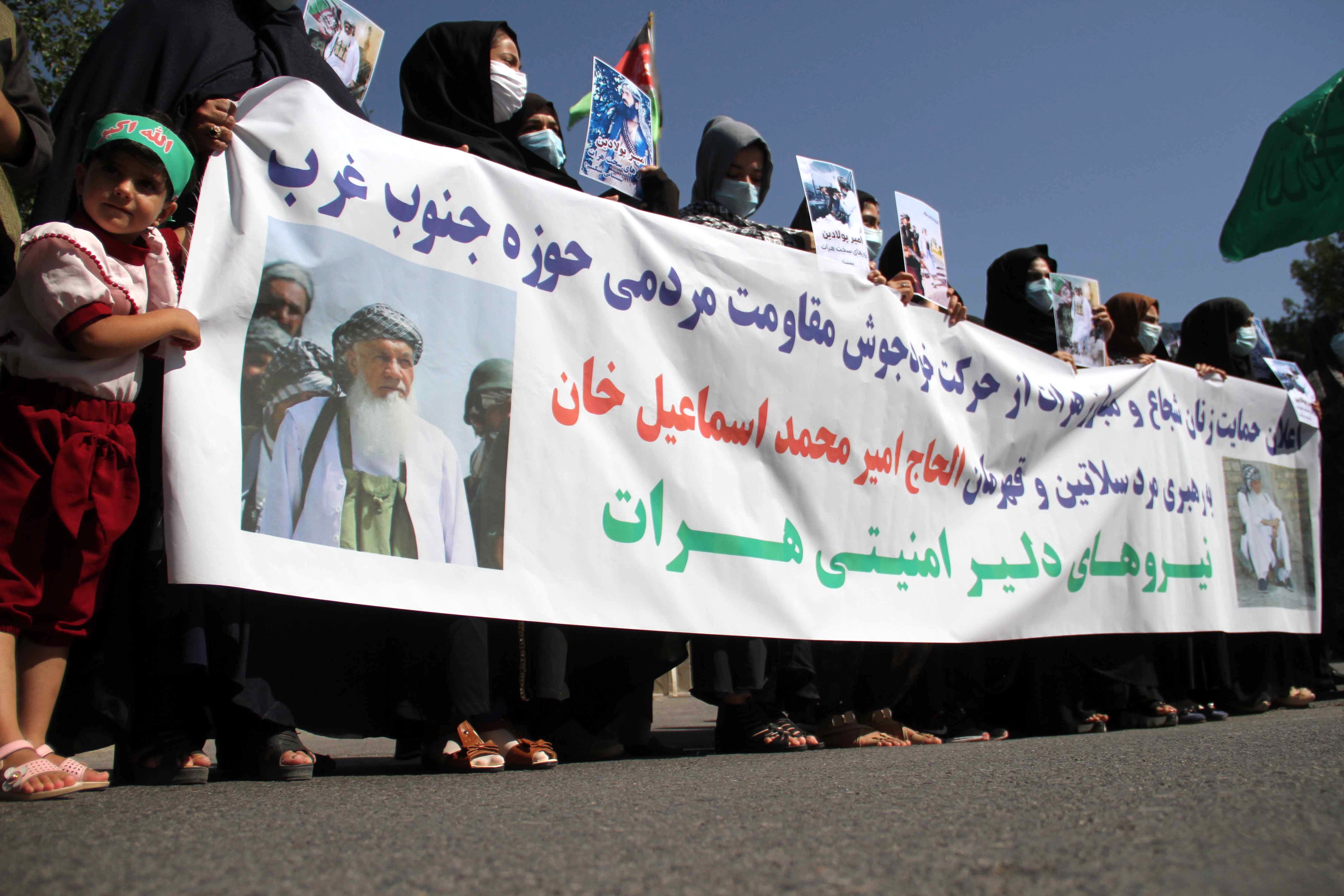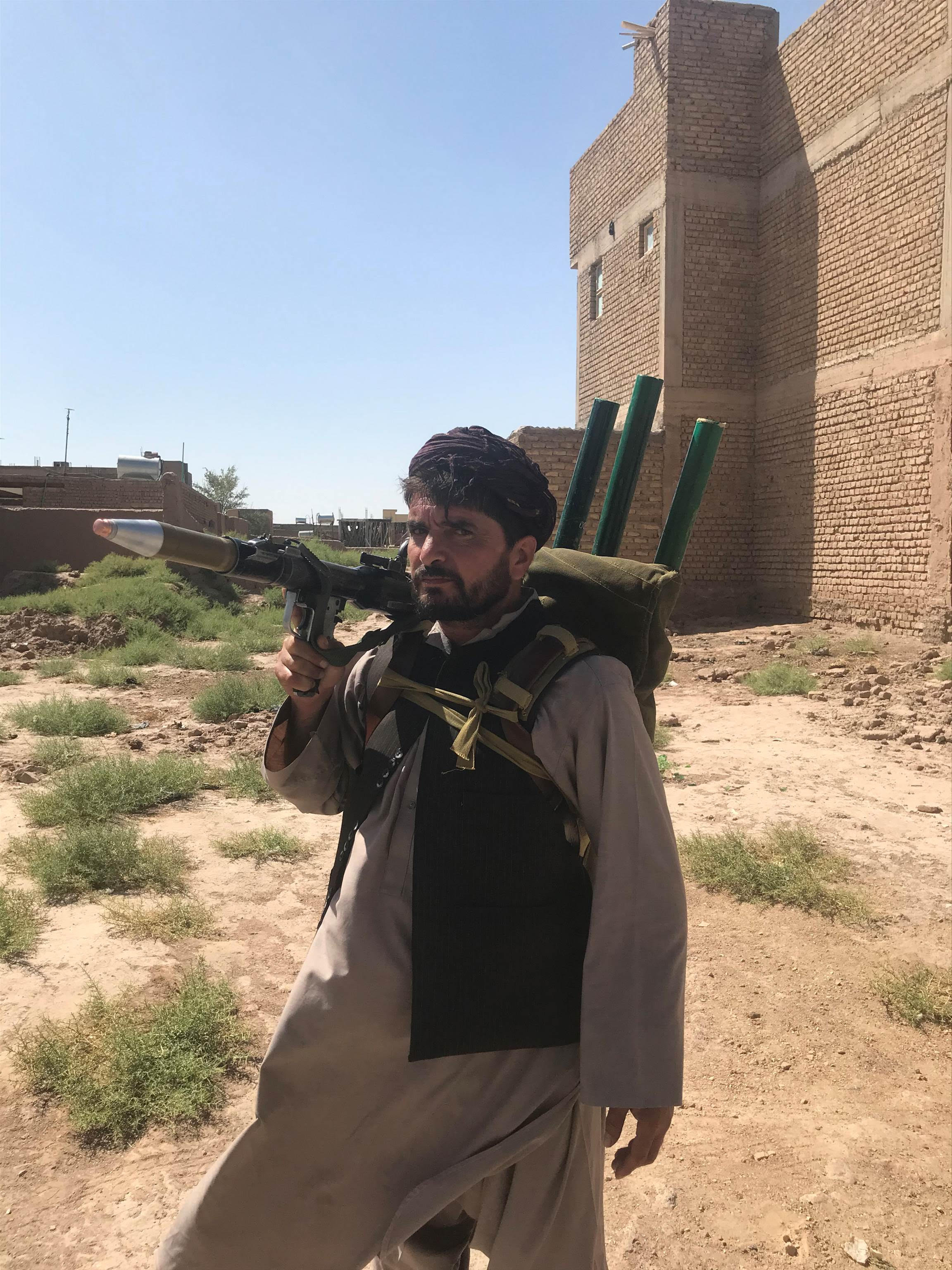On the front line in Afghanistan with Ismail Khan, the ‘Lion of Herat’
Kim Sengupta reports from the fierce battle for Afghanistan’s third-largest city


Your support helps us to tell the story
From reproductive rights to climate change to Big Tech, The Independent is on the ground when the story is developing. Whether it's investigating the financials of Elon Musk's pro-Trump PAC or producing our latest documentary, 'The A Word', which shines a light on the American women fighting for reproductive rights, we know how important it is to parse out the facts from the messaging.
At such a critical moment in US history, we need reporters on the ground. Your donation allows us to keep sending journalists to speak to both sides of the story.
The Independent is trusted by Americans across the entire political spectrum. And unlike many other quality news outlets, we choose not to lock Americans out of our reporting and analysis with paywalls. We believe quality journalism should be available to everyone, paid for by those who can afford it.
Your support makes all the difference.The shots come in staccato bursts, echoing among the abandoned homes. A group of militia fighters take shelter behind broken walls while others rush forward with RPG launchers and machine guns to return fire as bodies are dragged away. The lethal skirmishes continue along one of the shifting front lines of Herat.
The battle has intensified over the last 24 hours, with government forces and volunteer militia launching a series of attacks to push back the Taliban from the edge of the city. The impetus to go on the front foot came after a string of losses elsewhere, with the insurgents on a roll, capturing four provincial capitals in rapid succession.
Zaranj in Nimroz and Sheberghan in Jawzjan, Kunduz city and Sar-e-Pol city have fallen in three disastrous days. There are reports that Aybak – the capital of Samangan province – has changed hands too, with local forces handing over the city to the Taliban.
But Kandahar, Herat and Lashkar Gah, the targets of sustained Taliban assaults, are holding on, and in Herat, the government – supported by US air strikes – has made some late gains, with commandos moving into areas which had been taken over by the insurgents.
The Talibs had countered in Herat by trying to push through Hawz Karbas, a district of alleyways and twisting lanes which offers scope for ambush, with snipers being able to make use of buildings from where residents have fled.
Here the fighting is at close quarters, brutal and confusing.
Opposing fighters are often indistinguishable from each other in their assortment of mismatched military fatigues and civilian clothing.

The Herat militia wear black and white keffiyehs – the colours of their commander, Ismail Khan. But the insurgents are also disguising themselves with the scarves. Muzzle flashes from one supposedly government checkpoint we approach are a reminder of how deceptive things can be on the ground.
Men carrying guns, a few with body armour over their loose shirts, can be seen at a distance through dust thrown up by a strong breeze. They appear to be looking intently into the ground. “Taliban,” the militias assure us, “seeing if they can use the sewers. We hope they try it again,” says one of the fighters, grinning.
An attempted infiltration through the tunnels beneath the road the previous day had not gone well. A Talib had crawled through the pipe, only to emerge right in front of a group of militias sitting on plastic chairs at a corner of an alley and having tea.
“There was some noise beneath us and then he came up right here,” says Shariyar Nezami, a militia officer, pointing at the narrow open fetid drain. “I am not sure who was more amazed, us or him. He was in a really filthy state; we didn’t know whether to shoot him or get a hosepipe and wash him down,” he says.
“But he raised his gun at us, so we had no choice but to shoot him. No one wanted to move the body afterwards; it had to be carried away wrapped in some plastic bathroom curtains we got from one of the houses.”
Looking down at the bloodstains on the pavement, Nezami pauses for a moment, and then continues in a quieter voice: “He was very young, he looked frightened... but the people who sent him don’t care, do they?”
The militias are preparing for another round of combat.
“We need to drive them further away because they keep sneaking into the centre to kill people. The commander is planning that: we need to be on the offensive to avoid what has happened to some of the other cities. We need to throw them back,” says Nezami.

There is cause for concern: Taliban fighters have been coming into the city at night, with clashes getting close to the centre. Arcs of mortar rounds flew low over buildings on Saturday as they attacked police and army bases yet again.
A quarter of a mile away, commander Ismail Khan – the 70-year-old renowned veteran mujahideen leader, known as “the Lion of Herat” – is reviewing the latest batch of recruits to join the militia he has organised, telling them that it is their duty to ensure that Herat does not fall.
The brief parade takes place at an old base that belonged to Isaf (the International Security Assistance Force).
The 12 young men are recent members of the army, the police and the intelligence service (the NDS – National Directorate of Security). They have joined the militia, they say, because of their frustration at what they see as the ineffectiveness of the government forces.
The commander orders that they be given some cash, as some have not been paid for months.
“Get some food, water, naswar ( a chewing substance) and hash: you lot look like a bunch of desperate drug takers,” he says as a few of the men laugh nervously. “I was joking: go and buy what you need, but make sure everything is paid for,” Khan adds without a smile.
Some of the men wonder if they could have American weapons, which they have trained with, rather than the Russian Kalashnikov AK-47s they have just been given. A plump man in his twenties, wearing a shiny green kaftan, who has appointed himself their spokesperson, wants to point out that they would be even more effective with weapons they were familiar with.
We pray for peace, but I think we are cursed with never getting peace in Afghanistan
The commander says he will see what can be done. But a hawk-faced former mujahideen in his fifties, re-mustered as a senior sergeant, is getting exasperated. “Take them off the Taliban you kill: they have American weapons the Pakistani army uses. Let’s see how good you are in a fight,” is his terse advice.
Commander Khan is handed his own Kalashnikov, an elderly model with a gnarled wooden stock that is cracked in places. “I have this for more than 30 years; I am very fond of this one. I have used this against the Russians, against the Talibans and other enemies of Afghanistan. Now I have to use it again,” he says, holding up the gun.
Unlike his men with their body armour, Khan wears a white salwar kameez and a black waistcoat, his frame slightly stooped with age, but the eyes above the flowing silver beard are animated as he talks about what he sees as an existential struggle.
“This campaign we are fighting now is one of the most important of my life. The Taliban are just the pawns of the Pakistanis: this is a war between the governments of Afghanistan and Pakistan. And if we lose this, then we would lose our country for a very long time,” he says, jabbing his finger in the air.
“I decided to take up the fight so late in my life because the people know just how long I have served Herat. I could call on the mujahideen who fought against the Russians, but as you can see, their sons as well. And it is not just men: women of all ages are playing their parts as well. We know how much they are worried about the Taliban.”
The old Isaf post the commander and his men have gathered at used to be a fortified base. It has protective Hesco bags around the walls, and a recently repaired sangar with a machine-gun post at the top. While guns are being cleaned, a fighter carefully waters a solitary rose bush surrounded by spent cartridges. “We should turn this place into a garden when all this is over,” he tells a quizzical colleague.
Commander Khan wants to stress: “One of the reasons for the problem we face now is the way, the rush, with which the Americans retreated. The way they left Bagram (airbase) at the middle of the night without telling our Ministry of Defence was extraordinary.”
“The withdrawal of their forces across the country should have been much better coordinated. They had 20 years here to work out how they would leave, and they left like that. But I am glad they have gone; we can now focus on defending ourselves.”

Khan, like other politicians and commanders across the country, has previously attacked the Afghan government for failing to provide adequate reinforcements and weapons to the volunteer force. He was particularly critical of the defence minister, Bismillah Khan Mohammadi.
But that was before the minister’s home was attacked in a suicide bombing and gun attack last week in which 13 people died. Khan is more circumspect now. “It is a difficult situation; of course we can do with more of everything, but everyone is under pressure. I am sure that everyone is doing their best,” he says.
Some of the commander’s men disagree with this assessment. Taking pot-shots at the enemy in the Hawadi district, Basir Ahmed is glad he left the army: “At least we are doing some fighting now, we are standing up to them: that is what we were failing to do before.”
Ahmed, 27, joined the volunteers a week ago. “I was with a unit in Pashtun Zarghan and everything was wrong. We weren’t even getting our food rations. We should have been fighting the Taliban and the Pakistanis really hard, but that didn’t really happen,” he says.
“At the end we were told to just abandon our position and we had to leave behind weapons, even Humvees. It makes me feel very angry just thinking about it: at least I have a chance to fight back now. I have killed some Taliban. I don’t feel sorry because they want to kill me.”
Shariyar Nezami nods. “That is why a lot of us joined: if we are to die, let’s do so here making a stand. This is far better than doing nothing, letting the Taliban take over, then get hunted down and killed like dogs.”
An elderly man approaches with his son. They have been forced to leave their home by the fighting and want to reclaim some belongings.
“Don’t go... if you do, you’ll find the Taliban have left some gifts,” says Nezami, reminding them that IEDS ( improvised explosive devices) have been found in the houses, some embedded in walls.
The resident, Hidaytullah, pleads his case to be allowed through, but fails.
“We always suffer, ordinary people like us. My family and I have been refugees for many years before and we don’t want to have to go through that again. But we have to prepare, and we came for our suitcases,” he says, shrugging in resignation as he turns to trudge back down the road.
“They say it’s too dangerous to go to my house, but where’s safe? Who knows will happen? We pray for peace, but I think we are cursed with never getting peace in Afghanistan.”
Join our commenting forum
Join thought-provoking conversations, follow other Independent readers and see their replies
Comments